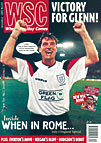 Jan Molby was loved at Swansea but Huw Richards documents how his reign as manager was ended
Jan Molby was loved at Swansea but Huw Richards documents how his reign as manager was ended
The sacking of Jan Molby under-lines what we already suspected about the new owners of Swansea City – they are either brave, daft or both. You must be to take over a Third Division football club, and you certainly have to be to then sack an authentic folk-hero.
The new owners, Silver Shield Ltd, came in to considerable goodwill for finally ending Doug Sharpe’s tenure – not least from Sharpe, who must at least be credited for not quitting altogether when he was patently sick of the entire business.
Sacking Molby uses up a huge chunk of that goodwill at one go. It isn’t that we’re not used to losing managers. But none, not even John Toshack when he was finally removed after a short and ill-judged second term of office, has departed to such regret and anger among the fans.
Regret over Molby’s departure wasn’t deference to a big name – Swans fans never really extended much affection to Terry Yorath, for all that he was a reasonably successful manager. Nor did anybody realistically believe, in spite of the Liverpool connection, that he might be the second coming of John Toshack. There was little resemblance between the decaying, demoralized club Molby inherited and the recently revitalized base on which Toshack built so brilliantly two decades earlier.
Swansea’s taste for the foreign and exotic is well concealed. It would be easy on the 22 afternoons of the season when largely ersatz venom is being heaped on English clubs, still easier on the 23rd when Cardiff City are in town for the annual festival of the grotesque, to believe that Swans fans don’t like anyone from west of Bridgend.
Yet nobody, not even local heroes like Alan Curtis and Robbie James, was better loved during the great years than the Yugoslav duo of Dzemal Habziabdic and Ante Rajkovic. The North Bank thinks more of João Moreira, an elegant but over-left-footed Portuguese full-back, than Molby did. A scouse-accented Dane, particularly one with Molby’s amiable, laid-back personal style could hardly fail to appeal.
His playing style also fitted the Swans tradition of at least trying to play decent football. Even if he turned about as fast as the bulk container he increasingly resembled, Molby’s ability to see and play the perfect ball remained undimmed. His values – emphasizing control, passing and precision – were inculcated into what looks the club’s best crop of youngsters in 20 years. It isn’t their fault they have been buttressed with too little experience so far this season.
Molby restored hope where there seemed very little, briefly giving the Vetch a buzz it has rarely had since the Toshack days. The sight of Northampton at the top of the Second Division only reinforces what-might-have-been feelings about last season’s Wembley play-off.
His record was not totally spotless. As a buyer he was distinctly iffy, although Tony Bird, £30,000 from Barry Town, looks the Swans’ first natural goalscorer since Bob Latchford. He was expensive himself, although reports that he was the second-highest paid manager outside the Premiership look like disinformation. It isn’t as if such figures are readily available. And he didn’t always help himself. Hopelessly prone to heckling referees, he seems to have adopted the same tactics towards his chairmen.
While the disillusioned Sharpe put up with this, the new owners – whose ambitions already stretch beyond football to a serious bid for a Rugby League Super League franchise – were less tolerant. It is hard to avoid the conclusion that they seized the opportunity provided by a run of poor results and the sudden availability of Micky Adams to dump a manager whose capacities they doubted.
Much less defensible was the simultaneous axing of assistant manager Billy Ayre, who will be fondly remembered as an exponent of the northern macho style of dress, short-sleeved and shorted in any match conditions short of actual blizzard.
The rapid departure of Micky Adams, echoing some of the Molby’s complaints, tips the balance of doubt the Great Dane’s way. Two years on from the Kevin Cullis fiasco, when a non League youth coach lasted a week as team manager, the Swans are again visibly in chaos.
From WSC 130 December 1997. What was happening this month